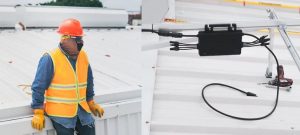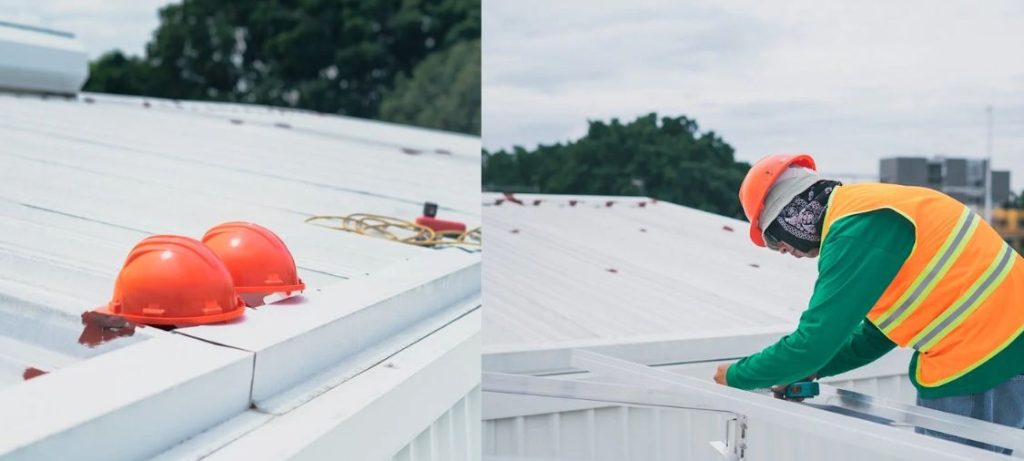
Technological advancements are reshaping industries across the board, and roofing is no exception. Industrial roofing, in particular, has seen remarkable progress with the advent of smart roofing technology. These innovative solutions are revolutionizing how businesses approach roof management, offering enhanced durability, energy efficiency, and cost-effectiveness.
From real-time monitoring systems to self-healing materials, smart roofing technology is not only addressing common industry challenges but also setting new standards for sustainability and performance. We delve deep into how smart roofing technology is transforming industrial roofing, ensuring long-term benefits for businesses and the environment alike.
What is Smart Roofing Technology?
Smart roofing technology integrates advanced sensors, data analytics, and automation into industrial roofing systems. These innovations enable real-time monitoring of roof conditions, including drainage efficiency and structural integrity, for both metal roof and bitumen-based installations.
By incorporating smart features, industrial roofs become proactive in detecting and preventing issues. This technology can identify potential problems before they escalate, such as leaks in polyvinyl chloride (PVC) membranes or drainage blockages, allowing for timely interventions and maintenance.
Smart roofing systems often include energy management capabilities, optimizing heating and cooling processes to reduce operational costs. This functionality is particularly beneficial for large industrial facilities with extensive roof areas, helping to manage energy consumption and align with sustainability goals.
While the initial investment in smart roofing technology may impact your budget, the long-term benefits often outweigh the costs. These systems can extend roof lifespan, minimize repair expenses, and improve overall building efficiency, providing a strong return on investment for industrial facilities.
Types of Smart Roofing Solutions
Smart roofing solutions encompass various technologies to enhance industrial roofing performance. Learn more about them below.
Sensor-based roofing systems.
Sensor-based roofing systems employ advanced technology to monitor crucial aspects of your industrial roof’s performance. These systems use strategically placed sensors to detect changes in temperature, moisture levels, and structural integrity, providing real-time data on roof conditions. You can track heat distribution, identify water accumulation, and schedule timely inspections based on this information.
Reflective and energy-efficient materials.
Reflective and energy-efficient materials have revolutionized industrial roofing by significantly reducing heat absorption and energy costs. These advanced materials, including sheet metal with specialized coatings, reflect ultraviolet rays and minimize heat transfer. You can expect improved thermal performance and extended warranty periods when incorporating these innovative solutions into your roofing system.
Self-healing roofing membranes.
Self-healing roofing membranes represent a significant advancement in industrial roofing technology, offering enhanced durability and longevity. These innovative membranes contain microcapsules filled with healing agents that activate when damage occurs, automatically repairing small cracks and punctures. You’ll find this technology particularly beneficial in manufacturing environments where roof integrity is crucial for operational efficiency.
3D Printing in Roofing
3D printing technology is revolutionizing industrial roofing by enabling commercial roofing contractors to create custom components on-site. You can now benefit from rapid production of complex roofing elements, reducing material waste and installation time. This innovative approach allows for precise fabrication of unique shapes and sizes, addressing specific challenges in your industrial roofing projects.
Silicone Roofing
Silicone roofing offers a cutting-edge solution for industrial roof restoration, providing exceptional durability and weather resistance. As a roofing company specializing in smart technology, you can implement silicone coatings to extend the life of various roofing substrates, including metal, built-up, and single-ply systems. This innovative material forms a seamless, waterproof barrier that withstands extreme temperatures and UV exposure, making it an ideal choice for industrial facilities seeking long-term protection.
AI-powered predictive maintenance tools
AI-powered predictive maintenance tools revolutionize industrial roofing by analyzing data from sensors and historical records to forecast potential issues. You can implement these advanced systems to monitor your roof’s condition continuously, allowing for proactive maintenance and reducing the risk of unexpected failures. Industrial roofing contractors now use these tools to optimize inspection schedules and prioritize repairs efficiently.
Benefits of Smart Roofing Technology for Industrial Applications

Smart roofing technology offers significant benefits for industrial applications, enhancing your commercial roofing services. Here are notable benefits of using such a type of industrial roofing.
Cost Efficiency
Smart roofing technology enhances cost efficiency for your industrial roofing services by reducing maintenance expenses and extending roof lifespan. By implementing advanced monitoring systems, you can detect and address issues early, preventing costly repairs and minimizing downtime for your industrial facility.
As an industrial roofing company, you’ll benefit from the integration of thermoplastic materials and smart sensors in your commercial roofing projects. These innovations improve energy efficiency, lowering operational costs and providing a significant return on investment for your clients in the long run.
Enhanced Durability
Smart roofing technology enhances the durability of your commercial roofing systems, providing superior protection against environmental factors. By incorporating advanced materials and sensors, you can significantly extend the lifespan of your roof system, reducing the frequency of replacements and repairs. This improved durability translates to better insurance rates and lower long-term costs for your industrial facility.
When you request a quote for a smart roofing system, you’ll find that these technologies offer enhanced resistance to weathering, UV radiation, and chemical exposure. The intelligent monitoring capabilities allow you to address potential issues before they escalate, ensuring your roofing system maintains its integrity over time. This proactive approach not only protects your investment but also minimizes the risk of unexpected failures that could disrupt your operations.
Improved Safety
Smart roofing technology significantly improves safety in industrial roofing applications. You’ll find that advanced sensors and monitoring systems integrated into your commercial roofing system can detect potential hazards, such as excessive weight loads or structural weaknesses, before they become critical issues. This proactive approach reduces the risk of accidents and injuries, enhancing workplace safety for your employees and maintenance personnel.
By implementing smart roofing solutions in your industrial roof, you benefit from real-time alerts and automated safety protocols. These systems can identify areas requiring immediate attention, allowing you to prioritize maintenance and repairs effectively. Whether you’re dealing with a GAF manufacturing facility or considering a free roof inspection, smart technology ensures your roofing industrial applications meet the highest safety standards, protecting your assets and workforce.
Energy Efficiency
Smart roofing technology significantly enhances energy efficiency in industrial commercial roofing systems across North America. You’ll experience reduced energy consumption and lower utility costs by implementing advanced insulation materials and reflective coatings on your warehouse or industrial facility roof. These innovations minimize heat transfer, decreasing the load on your HVAC systems and improving overall energy performance.
By integrating smart sensors and automated climate control features into your industrial roof, you can optimize energy usage based on real-time conditions. This proactive approach to energy management not only reduces your carbon footprint but also minimizes the need for frequent industrial roof repairs and maintenance. You’ll benefit from a more sustainable and cost-effective roofing solution that aligns with modern energy efficiency standards.
Real-World Applications of Smart Roofing Technology in Industrial Settings
Smart roofing technology is revolutionizing industrial settings, enhancing construction efficiency and building longevity. You’ll find innovative applications in warehouses, manufacturing plants, and data centers. Here is how smart industrial roofing technology can be used in various applications.
Warehouses
Smart roofing technology enhances your warehouse operations by incorporating adhesive-based sensors and polyurethane coatings. These innovations monitor roof conditions, detect leaks, and optimize energy consumption, reducing wear and tear on your storage facility. You’ll experience improved customer service as your warehouse maintains consistent temperatures and protects inventory more effectively.
Manufacturing plants
Smart roofing technology enhances your manufacturing plant’s productivity by protecting critical assets from environmental factors. You can implement advanced roofing systems that resist corrosion and improve ventilation, maintaining optimal conditions for your production processes. These innovative solutions integrate seamlessly with your building’s infrastructure, minimizing disruptions and extending the lifespan of your facility.
Data centers
Smart roofing technology demands your attention in data center management across the United States. You can enhance your asset management strategy by integrating smart roofing systems that monitor temperature, humidity, and potential leaks. This investment in infrastructure protects your critical IT equipment and improves energy efficiency, reducing operational costs and minimizing downtime risks.
Future Trends in Smart Roofing Technology
Future trends in smart roofing technology focus on data-driven innovation. You’ll see advanced analytics transforming how you manage and maintain industrial roofs, enabling predictive maintenance and optimizing performance.
Emerging smart roofing solutions will integrate with building management systems, enhancing energy efficiency and sustainability. You can expect improved concrete roof performance through smart sensors that monitor structural integrity and environmental conditions.
Smart roofing technology will address specific challenges like snow load management. You’ll benefit from automated systems that detect and respond to snow accumulation, preventing potential emergencies and structural damage.
Innovation in materials science will lead to self-healing and adaptive roofing systems. You’ll see roofs that can automatically repair minor damage and adjust their properties based on environmental conditions, significantly extending lifespan and reducing maintenance needs.
Conclusion
Smart roofing technology is revolutionizing industrial roofing by integrating advanced sensors, data analytics, and automation to enhance performance, durability, and efficiency. This innovative approach enables real-time monitoring, predictive maintenance, and energy optimization, leading to significant cost savings and improved safety in industrial facilities. From sensor-based systems and self-healing membranes to AI-powered tools and 3D printing, smart roofing solutions offer a wide range of benefits for warehouses, manufacturing plants, and data centers. As technology continues to evolve, smart roofing will play an increasingly crucial role in transforming industrial infrastructure, driving sustainability, and ensuring long-term operational success.
